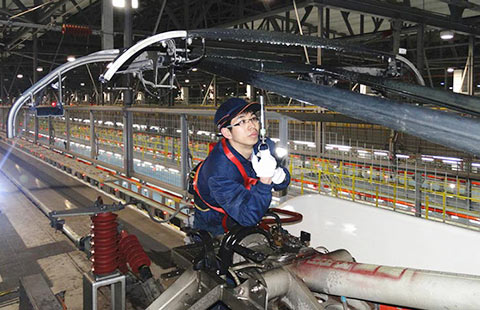Market turbulence exposes weakness of global economy, rather than China
(Xinhua) Updated: 2016-02-15 17:05BEIJING - Chinese stock markets tumbled Monday after the week-long lunar New Year public holidays. The slide is not surprising as the stock markets in the United States, Europe and Japan all had a turbulent week.
Market players should stop singling out China as the major cause for the global market turmoil. China is not immune to such turbulence, and the world needs coordinated efforts.
While it is true that the Chinese economy and financial markets have increasing influence on others, it is not true, however, that China is the major problem.
The Chinese stock markets have been closed for the entire week, during which Chinese authorities did not release any economic data or announce new policies.
The tumultuous market is a reflection of the world economy troubled by a prolonged fragile recovery over the past years as countries used extremely loose monetary policies to prop up asset prices in an effort to avoid the busting of bubbles. A deflationary trend has also made it even more difficult for decision-makers to deal with the challenges.
Japan adopted the unusual policy of negative interest rates. Europe is still slow in recovery and the concerns over the financial health of major European banks were one of the triggers to the latest global market turmoil.
Uncertainties over the future US monetary policy, which has been a source of market volatilities over the past year, was again one of the factors in play. Both demand and supply have weighed down on the prices of oil, making it more difficult for some oil exporters.
While China is struggling to restructure its economy, the overall situation remains favorable and a hard landing is unlikely.
China's 6.9 percent economic growth in 2015, though significantly lower than that of the previous years, was among the highest in the world. Considering the growing size of the Chinese economy, its added output last year could easily surpass annual figures in the past.
The slowing growth is largely a result of China's endeavor to optimize its economic structure. Such efforts have already shown effect as the tertiary sector is increasingly a new engine of the Chinese economy.
It is of utmost urgency that the world economies make coordinated efforts to restore investor confidence and stabilize the market and support growth. They should also be prudent with the introduction of measures that have potential spillovers to other economies.
- Chinese shares close lower - Feb 15
- HKMA respects HSBC's decision to remain headquartered in London
- Chinese company plans to sell its 50% share in Microsoft Online
- Chinese, Thai passengers drive growth at Cambodian airports
- Experts expect popularity of MPVs to surge in China
- Box office on Valentine's Day hits record high
- China's major coal-production region slashes overcapacity
- Renault opens plant in Hubei province to produce Kadjar SUV















